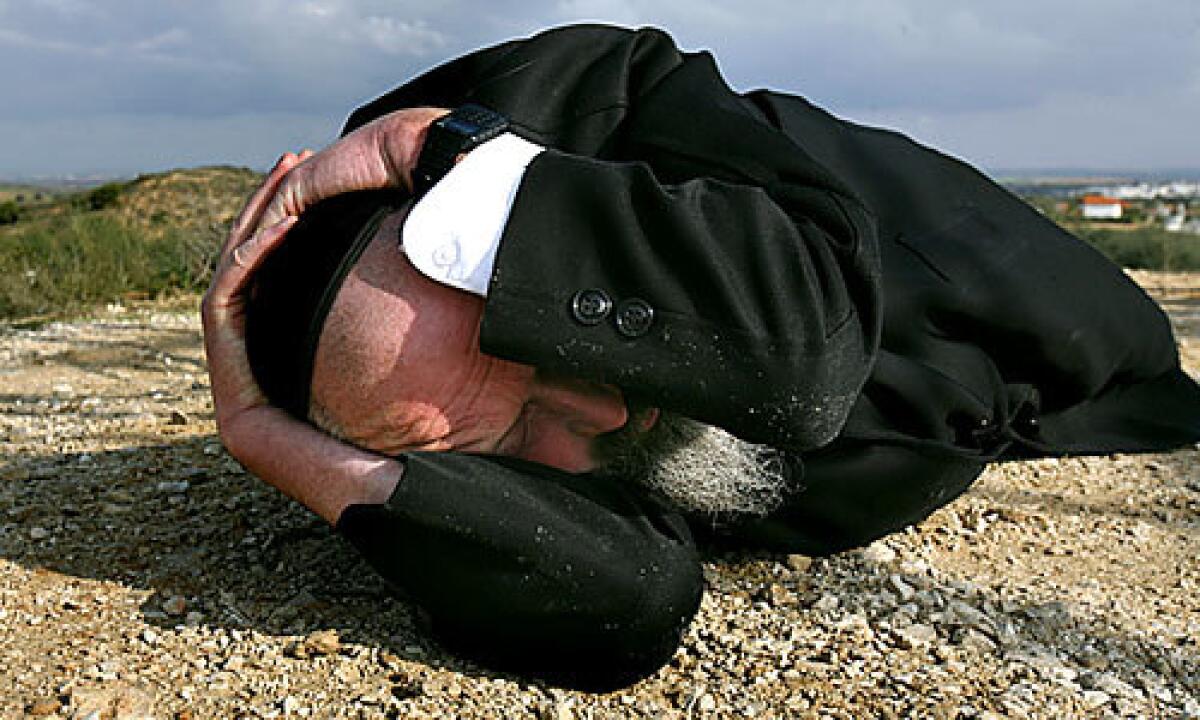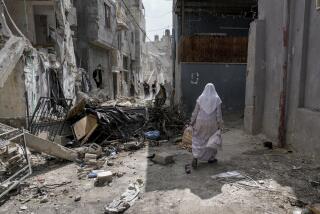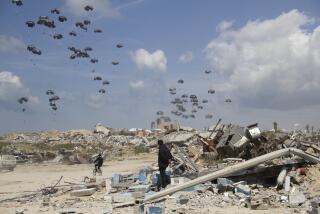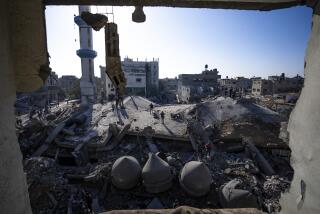Israel, vowing ‘all-out war’ on Hamas, continues airstrikes on Gaza

Residents of the Gaza Strip braced Monday for a long-feared Israeli tank incursion as warplanes pounded the tiny bottled-up coastal enclave for a third day.
The West Bank-based Palestinian Authority announced it was suspending peace talks with Israel to protest the Israeli campaign in against the militant Hamas movement, which controls the territory. The Gazan death toll rose to 364, many of them civilians, with about 1,400 wounded, local medical sources said.
In Israel, Defense Minister Ehud Barak promised an “all-out war against Hamas and its kind.” Speaking at a stormy session of the Knesset, the Israeli parliament, he said, “This operation will be widened and deepened as we see fit.” Barak promised “war to the bitter end” to neutralize the rocket fire from Palestinian militants in Gaza that has plagued southern Israeli towns.
Several Israeli Arab legislators were ejected for heckling.
“There are those who are profiting from Palestinian blood in order to get elected,” said Mohammed Barakeh, before being thrown out.
Among targets of Monday’s airstrikes were Hamas’ Interior Ministry in Gaza City and the homes of two senior military commanders in the movement. The ministry, evacuated days ago, had no casualties. But in the Jabaliya refugee camp, seven civilians died in the strike on the home of Maher Zaqout, a commander with Hamas’ military wing. Zaqout was not home; like many of Hamas’ senior leaders, he went into hiding when the attacks began.
Hamas and other factions fired at least 50 rockets into southern Israel, killing three Israelis on Monday and injuring dozens -- among the deadliest launches by Hamas to date. The group has shown a capability to strike deeper into Israel despite the ongoing assault.
Israeli Foreign Minister Tzipi Livni told reporters Monday that Israel is trying to avoid civilian casualties whereas Hamas is “looking for children to kill.”
Israel declared the area around Gaza a closed military zone, ordering out journalists as troops and tanks built up outside the enclave. The number of Israeli troops on the border has reportedly doubled, and officials have approved the calling up of more than 6,000 reservists. The expulsion of the journalists deepened fears among Gazans that a tank assault was imminent.
Israel closed the main border crossing with Gaza at the start of the attacks Saturday, preventing most Western journalists from entering Gaza. Limited shipments of humanitarian and medical supplies have been allowed in from Israel and through the Rafah border crossing with Egypt.
The Israeli offensive continued to inflame Israeli Arabs and Palestinians in the occupied West Bank.
A Palestinian laborer was arrested after stabbing four Israelis in a West Bank settlement Monday, leaving one in serious condition.
Scattered clashes between Palestinians and Israeli soldiers continued throughout the West Bank, particularly in Hebron, where 18 people were hospitalized, some because of tear gas inhalation or injuries from rubber bullets.
Many shops in predominantly Arab East Jerusalem were shuttered in protest, and a firebomb was thrown at the entrance of Jerusalem’s Hadassah Hospital late Monday.
The Palestinian Authority -- controlled by the Fatah faction, Hamas’ bitter enemy -- has struggled to control demonstrations as public anger rises. Palestinian police have broken up numerous protests, and several officials warned of the dangers of unrest spreading through the West Bank. Hamas leaders in Syria and Sheik Hassan Nasrallah, head of Lebanon’s militant group Hezbollah, have called for a third intifada, or uprising.
Hamas defeated Fatah in January 2006 parliamentary elections, but it was shunned by Israel and most Western powers for its refusal to formally accept the Jewish state’s right to exist. After a unity government collapsed in June 2007, Hamas routed Fatah and took full control of Gaza.
Fatah now controls only the West Bank and the Palestinian Authority, from which Hamas members were expelled, and its leaders walk a tightrope between criticizing Hamas and appearing to support the Israeli assault. Palestinian Authority President Mahmoud Abbas courted controversy Sunday by blaming the violence on Hamas, for not renewing a six-month-long truce with Israel that expired Dec. 19.
On Monday, the Palestinian Authority made a public show of support for victims in Gaza. In the West Bank city of Ramallah, senior Palestinian negotiator Ahmed Korei announced that talks with Israel would be suspended.
“There can be no negotiations while this Israeli aggression is continuing,” Korei told reporters.
The move was largely symbolic; the negotiations, intended to produce an agreement that creates an independent Palestinian state, have shown scant progress after more than a year. What little momentum the talks possessed has dissipated in recent months as Israeli politicians shifted focus to national elections scheduled for Feb. 10.
United Nations Secretary General Ban Ki-moon harshly criticized both Hamas and Israel on Monday for the bloodshed. Ban has repeatedly described the Israeli attack as “excessive.” More than 60 of the Gazans killed were women and children, U.N. officials said; they had not determined how many of the dead men were civilians.
“All this must stop. Both Israel and Hamas must halt their acts of violence and take all necessary measures to avoid civilian casualties. A cease-fire must be declared immediately. They must also curb their inflammatory rhetoric,” Ban said. “Only then can dialogue start.”
Ban also accused world leaders and Arab governments of not moving quickly to help resolve the dispute.
White House spokesman Gordon Johndroe released a statement Monday saying the U.S. supports a cease-fire.
“In order for violence to stop, Hamas must stop firing rockets into Israel and agree to respect a sustainable and durable cease-fire,” Johndroe said from Texas, where President Bush plans to see in the new year. “That is the objective to which all parties need to be working.”
Arab League foreign ministers are scheduled to meet Wednesday to form a position on the Israeli offensive. Hamas leaders, however, frequently complain that moderate Arab states such as Egypt are secretly pleased with efforts to weaken Hamas, which they say is viewed with suspicion.
Abu Alouf is a special correspondent. Special correspondent Maher Abukhater in Ramallah and Gabby Sobelman of The Times’ Jerusalem Bureau contributed to this report.
More to Read
Start your day right
Sign up for Essential California for news, features and recommendations from the L.A. Times and beyond in your inbox six days a week.
You may occasionally receive promotional content from the Los Angeles Times.






